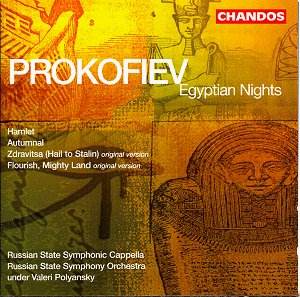The
first note on the CD, the first note of Zdravitsa, hooks
you; it’s utterly gorgeous. Both orchestra and chourus performances
throughout are top drawer, and the sound is fully up to Chandos’s
extremely high standards even though this recording was made in
Russia. Praise be that the text of Zdravitsa is sung in
Russian, for it is awful fawning pseudo-patriotic Stalin worship.
But rather than attack Prokofiev for writing music to such texts,
we should consider music written by Bach, Beethoven, et al., under
similar circumstances and reflect that some things do not change
much. And so long as the music is so beautiful, why worry if we
don’t like its politics? Reflect that Stalin is dead, the music
is alive, and Prokofiev’s genius lives forever.
Flourish
Might Land is similar in character, briefer and not quite
so high in quality, but still very much worth hearing.
Autumnal
is delightful, a short atmospheric tone poem he began at the conservatory
and worked on for 24 years. It might be compared to Stravinsky’s
Fireworks, also a brief, early, colourful teaching piece
that did not reflect the mature style of the composer; or to Anton
Webern’s affectionate farewell to Straussian romanticism, Im
Somerwind.
Egyptian
Nights is the title of an unfinished monologue by Pushkin;
by amalgamating some of Shaw and Shakespeare, Tairov put together
a play and Prokofiev provided incidental music for the production
in 1938. The seven numbers making up Op. 61 have exotic sounding
titles, but the music is not Prokofiev’s best, not comparing favourably
with the character pieces from Romeo and Juliet. ‘A Night
in Egypt’ is a steal from night music from Act III Scene 1 of
Verdi’s Aïda. The other brief pieces are more original
but sound much like background music. Perhaps the best are a four
minute musical portrait of Mark Antony and the five minute ‘Fall
of Cleopatra.’ The four minute ‘Roma Militaris’ consists of menacing
fanfares and could be taken for an excerpt from one of the later
symphonies. Other Russian composers have written music with this
title, as the Pushkin fragment continues to intrigue Russian dramatists.
The
Hamlet music consists of Ophelia’s songs and the gravedigger’s
songs, as well as five orchestral pieces. The question arose as
to whether Danish or English folk songs would be more appropriate,
and Prokofiev has chosen to use some ‘English’ folk songs (including
The Campbells are Coming!) to set these Russian translations.
From the four language parallel texts we learn that the Russian
for Hey nonny nonny hey nonny is Zi vertis, vertis,
vertis, vertis which can be roughly re-translated as ‘round
and round and round.’ The songs are pleasingly lyrical and well
sung, and the orchestral sections demonstrate Prokofiev’s amazing
ability to write deliberately unfocussed music that can be trusted
to remain in the background.
Paul
Shoemaker
